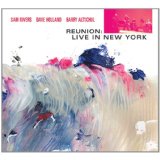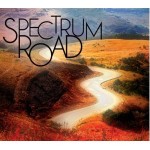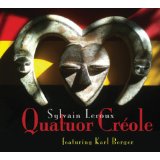Away for a week, upon my return I’m looking at 30 new releases, a surprising number for late August. Of course they’ve been pouring in all summer — this has been an extraordinary season for the issue of ambitious new projects by young artists and veterans both. Here are some immediate reactions to a handful.
 Fred Kaplan, Hold My Mule (Regal Radio Records, available from the artist’s website) — Yes, they still cut ’em like they used to, live-no-overdubbing: R&B drenched instrumentals a la the 1940s – 50s, by Los Angeles-area keyboardist Kaplan with tenor saxophonist Gordon Beadle; guitarist Junior Watson; Richard Innes on drums; David Kaplan, congas and Kedar Roy, bass. Even the mix echos with half-century old vibes, as the band lays down slow drags, shuffles and jump style material that fits somewhere between Erskine Hawkins’ “After Hours” and the King Curtis tracks on King Records. The leader’s piano work is splashy but articulate — he may play jazzier sometimes, but here doesn’t get much more modern than occasional nods to Count Basie and Professor Longhair’s rhumba-boogie rhythms. Beadle adds fine honk, Watson deft figures and brief breaks, Roy keeps steady time and Innes adds a fat back-slap to the 17 tracks (all under 5.08  minutes, and radio friendly). Thanks to my long-ago high school friend Jacki Sackheim (who took some of the cd’s session photos) for turning me on to this one.
Fred Kaplan, Hold My Mule (Regal Radio Records, available from the artist’s website) — Yes, they still cut ’em like they used to, live-no-overdubbing: R&B drenched instrumentals a la the 1940s – 50s, by Los Angeles-area keyboardist Kaplan with tenor saxophonist Gordon Beadle; guitarist Junior Watson; Richard Innes on drums; David Kaplan, congas and Kedar Roy, bass. Even the mix echos with half-century old vibes, as the band lays down slow drags, shuffles and jump style material that fits somewhere between Erskine Hawkins’ “After Hours” and the King Curtis tracks on King Records. The leader’s piano work is splashy but articulate — he may play jazzier sometimes, but here doesn’t get much more modern than occasional nods to Count Basie and Professor Longhair’s rhumba-boogie rhythms. Beadle adds fine honk, Watson deft figures and brief breaks, Roy keeps steady time and Innes adds a fat back-slap to the 17 tracks (all under 5.08  minutes, and radio friendly). Thanks to my long-ago high school friend Jacki Sackheim (who took some of the cd’s session photos) for turning me on to this one.
 Sam Rivers/Dave Holland/Barry Altschul, Reunion: Live in New York (Pi Recordings) — Some 25 years after this trio’s previous gig, multi-instrumentalist Rivers, bassist Holland and drummer Altschul got together at Columbia University’s Miller Theater in 2007 for two sets of completely improvised interaction. Rivers, who had convened this combo in 1972, was 84 years old; he plays tenor and soprano saxes, flute and piano with deliberation, intensity, imagination, lyricism and tone that is utterly undiminished from the bluesy but free-from-conventions approach he brought to jazz as an robust old radical of 40 in the ’60s. Holland, when he first joined Rivers, was fresh from Miles Davis’ Bitches Brew band, and Altschul had worked with Chick Corea-Anthony Braxton in Circle, among other combinations — both men sound even better in the reunion setting than they had in the Rivers trio’s Impulse! albums, creating a vast, mostly upbeat universe that encompasses everything from spontaneous melodicism to sound-for-sound’s-sake abstractions. And the recording quality is fantastic: Holland ‘s bass is plum-juicy, Altschul’s every stroke distinct. Rivers begins the concert in strong form on tenor, and the band is engaged continuously, though the two cds are indexed in sections ranging from 15 to 4 minutes long (most are around 8.30), so just put this on and let it flow.
Sam Rivers/Dave Holland/Barry Altschul, Reunion: Live in New York (Pi Recordings) — Some 25 years after this trio’s previous gig, multi-instrumentalist Rivers, bassist Holland and drummer Altschul got together at Columbia University’s Miller Theater in 2007 for two sets of completely improvised interaction. Rivers, who had convened this combo in 1972, was 84 years old; he plays tenor and soprano saxes, flute and piano with deliberation, intensity, imagination, lyricism and tone that is utterly undiminished from the bluesy but free-from-conventions approach he brought to jazz as an robust old radical of 40 in the ’60s. Holland, when he first joined Rivers, was fresh from Miles Davis’ Bitches Brew band, and Altschul had worked with Chick Corea-Anthony Braxton in Circle, among other combinations — both men sound even better in the reunion setting than they had in the Rivers trio’s Impulse! albums, creating a vast, mostly upbeat universe that encompasses everything from spontaneous melodicism to sound-for-sound’s-sake abstractions. And the recording quality is fantastic: Holland ‘s bass is plum-juicy, Altschul’s every stroke distinct. Rivers begins the concert in strong form on tenor, and the band is engaged continuously, though the two cds are indexed in sections ranging from 15 to 4 minutes long (most are around 8.30), so just put this on and let it flow.
Sylvain Leroux, featuring Karl Berger, Quatuor Créole (Completely Nuts Records). Leroux is a French Canadian reeds specialist living in New York City who has devoted himself particularly to the tambin, or Fula flute, a traditional three-holed (but amazingly expansive) instrument from West Africa. His past recordings have him in company with Malian Bailo Bah, whom he rightly calls the Jimi Hendrix of Fula flutes, but here he collaborates with vibist-pianist Karl Berger, in whose Improvisers Orchestra Leroux has had a role, as well as percussionist Sergo Décius and bassist Matt Pavolka. Several of the ten tracks demonstrate a mellifluous acoustic quality and are cyclical as chants, but the nearly 12-minute “fantaisie créole,” for which Leroux switches to a conventional Western flute, has as an episodic structure with an introduction that touches on classicism; there’s also one piece overdubbed for compositional purposes. For variety Leroux vocalizes with or otherwise overblows on his tambin, picks up an alto sax and dozon ngoni (hunter’s harp), gives Décius and Pavolka their moments  and also Berger, whose vibes attack is metallically percussive, whose piano playing has warmth and lightness.
Richard Tabnik Trio, Symphony for Jazz Trio: A Prayer for Peace (New Artists Records) — Discs one and two  represent two complete performances of alto saxophonist Tabnik, drummer Roger Mancuso and bassist Adam Lane improvising quite freely on songs then addressing a six-movement piece that is in ambition, if not instrumentation, “symphonic.” Tabnik may be known, to some extent, for his appearances with pianist Connie Crothers, one of the most visionary explorers emerging from Lennie Tristano’s lineage, and like her he subscribes to the Tristano strategy of devising intricate harmonic variations of standards like “All the Things You Are,” “I Got Rhythm” etc. Glimpses of those themes peak out  from the trio’s otherwise nicely synchronized yet stream-of-consciousness play.
represent two complete performances of alto saxophonist Tabnik, drummer Roger Mancuso and bassist Adam Lane improvising quite freely on songs then addressing a six-movement piece that is in ambition, if not instrumentation, “symphonic.” Tabnik may be known, to some extent, for his appearances with pianist Connie Crothers, one of the most visionary explorers emerging from Lennie Tristano’s lineage, and like her he subscribes to the Tristano strategy of devising intricate harmonic variations of standards like “All the Things You Are,” “I Got Rhythm” etc. Glimpses of those themes peak out  from the trio’s otherwise nicely synchronized yet stream-of-consciousness play.
The saxophonist is extremely fluid within his personal saxophone sound, Â which is like a very close, intimating voice offering ideas at a rapid rate or bouncing back thoughts proposed by his bandmates. They, in turn, maintain a stream of deftly marked time, while remaining loosely responsive to Tabnik’s phrases and inflections. He pushes intonation into high-octave microtonality, with a logic in his lines akin to some of Anthony Braxton’s directions, the light dryness of Paul Desmond and occasional Ornette-like runs or fragments. However, I have a hard time distinguishing one movement of Tabnik’s symphony — each with a politically sensitive title — from the next. Well-attuned interaction by these three, though, musical heart in the right place. Available from the New Artists Records website.
Spectrum Road (Palmetto) — This one’s been in my possession for months, and I  heard the band live at the Blue Note in 2011, loving it. You’d think any group comprising Vernon Reid, Jack Bruce, John Medeski and Cindy Blackman Santana would be upfront about its personnel, but instead this all-star quartet puts the name of a song from the late, great drummer Tony Williams’ 1969 fusion masterpiece Emergency!, which unleashed a new level of  ferocious improvising energy months be the release of Miles Davis’ Bitches Brew.
heard the band live at the Blue Note in 2011, loving it. You’d think any group comprising Vernon Reid, Jack Bruce, John Medeski and Cindy Blackman Santana would be upfront about its personnel, but instead this all-star quartet puts the name of a song from the late, great drummer Tony Williams’ 1969 fusion masterpiece Emergency!, which unleashed a new level of  ferocious improvising energy months be the release of Miles Davis’ Bitches Brew.
Originally issued by Poldor, Emergency befuddled the era’s older critics and didn’t catch on with rockers, though Williams sang (oddly), and with his Lifetime trio of guitarist John McLaughlin + organist Larry Young = dynamite. Jack Bruce joined them playing bass (no singing) on its followup, Turn It Over, which has also been a cult favorite over the decades, appealing from the get-go with the instruction on its cover, “Play it loud.”
Spectrum Road does just that, covering the supersonics from both those album as well as Williams’ subsequent Ego, Believe It, and grab bag The Joy of Flying. Their eponymous album is in effect a recreation, certain the thrill the aging radicals who dug the original and have us hoping it reaches and appeals to new audiences, too. Ms. Blackman Santana is up to the effort of filling in for Williams, who died via medical error at age 52; Medeski is the wild multi-keyboardist of our era, standing on the shoulders of the sadly underappreciated Larry Young, Reid spews notes like sparks from a volcano and Bruce wails in the pocket with them all. There are two band-created tracks, “An T-eilan Muileach” on which Bruce wordlessly sings a traditional Scottish air, and “Blues for Tillmon,” a relatively laid back and loopy jam.  Come to this album for its celebratory echo of music that endures, then find Williams’ originals to listen again.
More, briefly:
- Marcus Miller’s Renaissance overflows with the bassist’s low-down thumb- plucking and his pleasure in instrumental layering that works for both performance and recording studio. His collaborators are technically exemplary, but the messiness of funk, its grit and heat, is missing. More appropriate for drinks on the patio than sweating on the dancefloor or between the sheets.
- Kurt Elling’s 1619 Broadway – The Brill Building Project is already getting talked up, as he gives familiar tunes-to-croon tunes dramatic twists, fully jazz, hipsterish, either earnest or ironic or both (darkest: “Pleasant Valley Sunday”). Laurence Hobgood, Kurt’s pianist/collaborator has just issued his Laurence Hobgood Quartet Featuring Ernie Watts recording on a small boutique label. It’s live from the Jazz Kitchen in Indianapolis April 2012, four original compositions ranging in length from  to 17 minutes. It floats on Hobgood’s intelligent compositions and sweeping improvisations, L.A.-based Watts’ commanding technique and not yet worldweary passion. Unfortunately, the cd has no title. It’s being sold exclusively through Circumstantial, online. If someone’s dealing it from a bandstand, grab a copy.
P.S. — On a jaunt to Philadelphia in July I was presented with some 15 productions of local yet stylistically diverse jazz on Dreambox Media. I’ve been working through them gradually, and so far like Crepuscule from the quartet Monkadelphia, in which Dreambox principal Jim Miller plays drums, and Ceremonies of Forgiveness by Bobby Zankel’s the Warriors of the Wonderful Sound. There are albums by pianist Jim Ridl and bassist Tyrone Brown among others who stay close to home; as elsewhere the immediate scene is happening, whether anyone but the circle of players realize it or not. Â Support local jazz musicians and local jazz productions — any and all styles — especially this week, in celebration of Charlie Parker’s 92 Birthday and the annual Labor Day U.S. jazz fests (Chicago, Detroit, Telluride, Angel City, and beyond).

